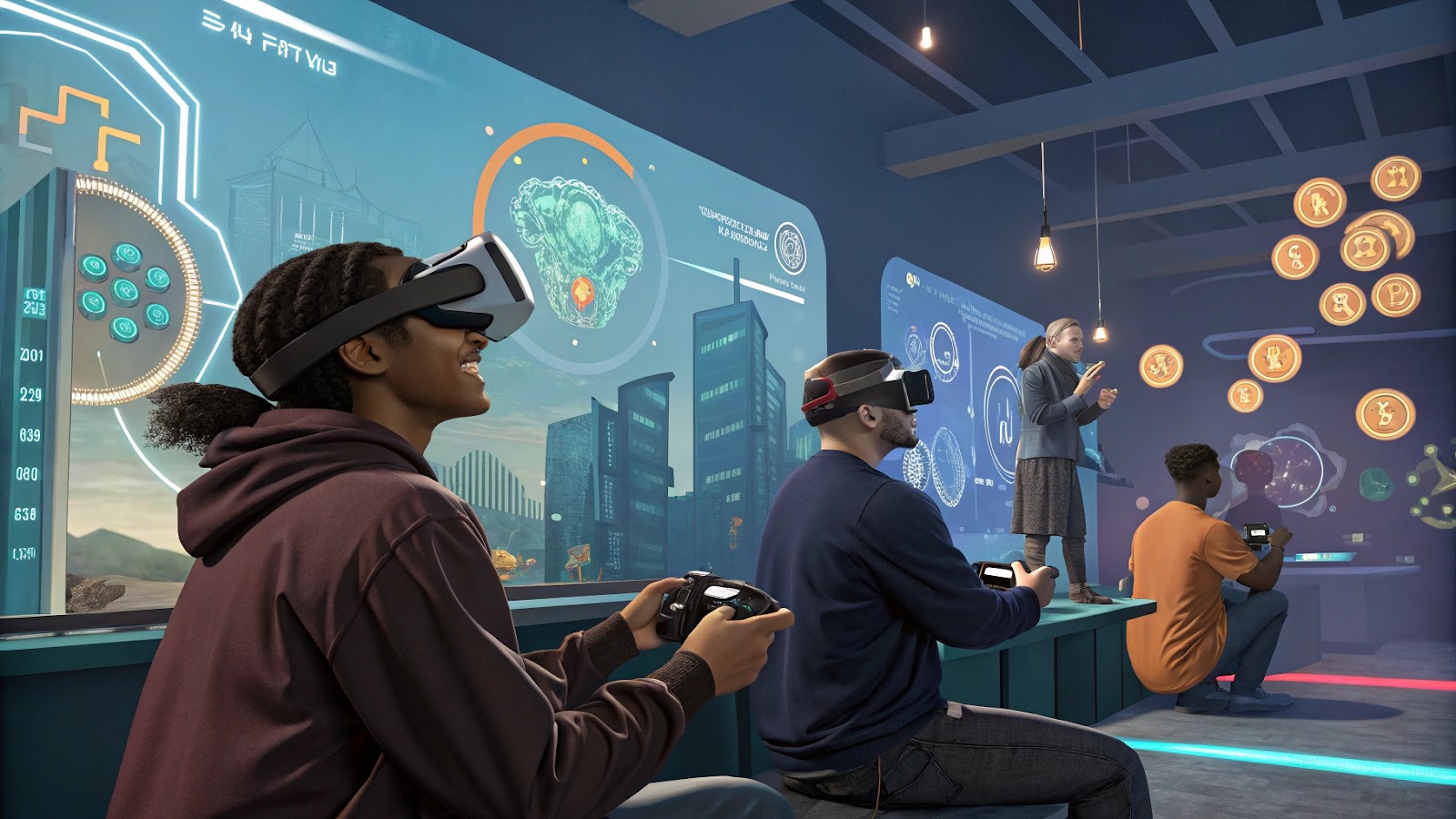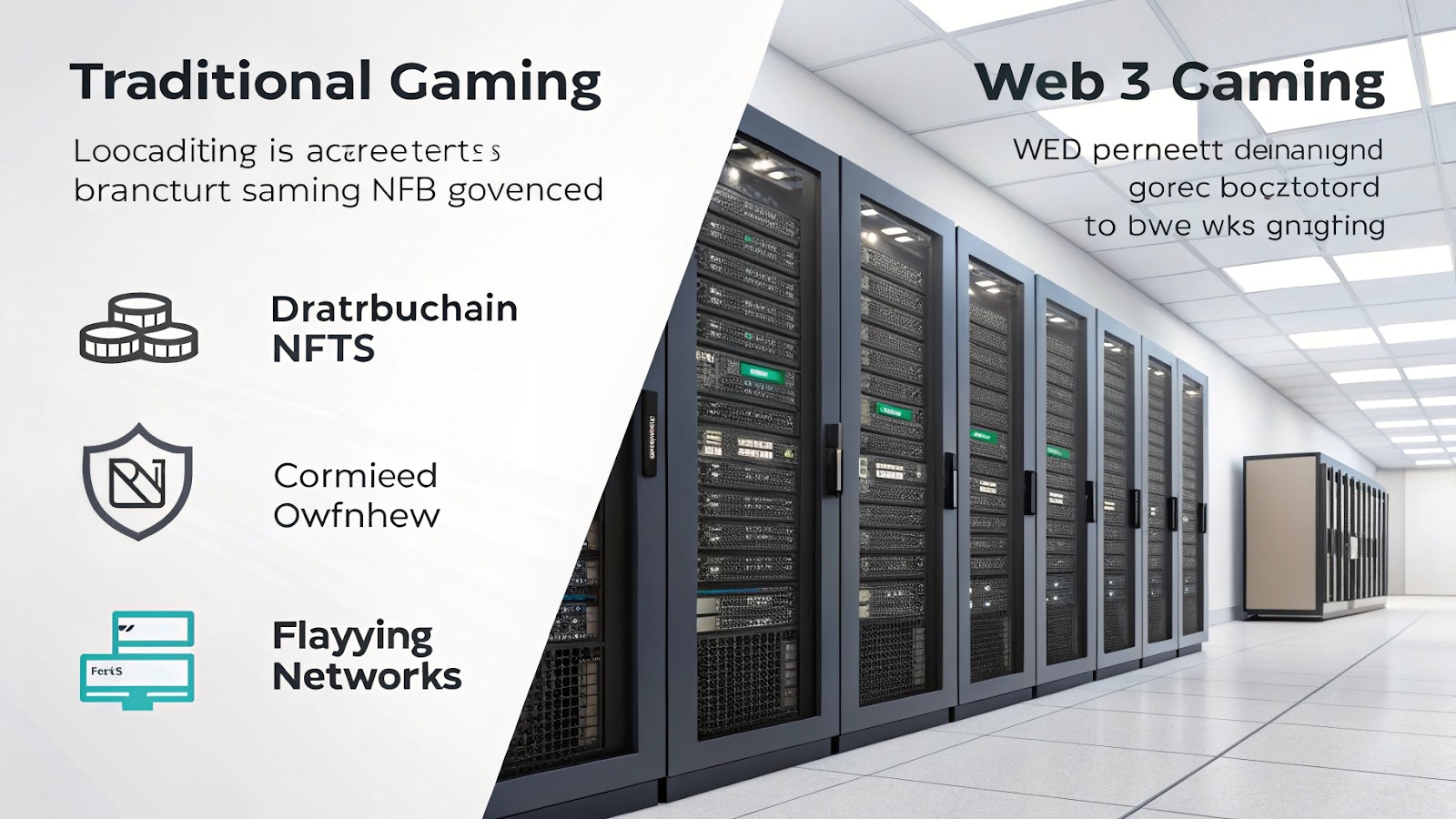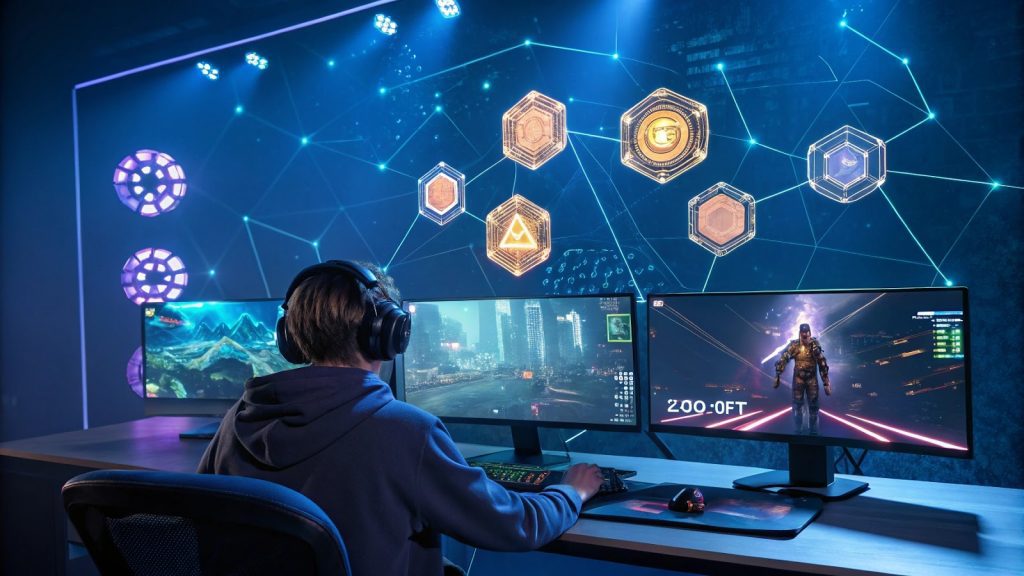Web3 gaming represents a revolutionary paradigm shift in the gaming industry, fundamentally transforming how players interact with digital games through blockchain technology, decentralized ownership, and economic empowerment. Unlike traditional gaming models where players invest time and money without true asset ownership, web3 gaming introduces unprecedented player sovereignty through non-fungible tokens (NFTs), cryptocurrency rewards, and decentralized governance structures. This emerging sector combines the entertainment value of conventional games with the financial opportunities of decentralized finance (DeFi), creating sustainable digital economies where players can earn real-world value from their gaming activities. The integration of blockchain technology ensures transparency, security, and interoperability across gaming platforms, while smart contracts automate complex game mechanics and reward distributions. As the gaming industry evolves toward decentralization, web3 games are positioned to redefine digital entertainment, offering players true ownership of in-game assets, governance rights, and economic participation in virtual worlds that extend beyond traditional gaming boundaries.
Understanding Web3 Gaming Technology
Web3 gaming fundamentally relies on blockchain technology to create decentralized gaming experiences that operate independently of traditional centralized servers and publishers. The underlying infrastructure utilizes distributed ledger technology to record all game transactions, asset ownership, and player interactions in an immutable and transparent manner. Smart contracts serve as the backbone of web3 gaming ecosystems, automatically executing game rules, reward distributions, and asset transfers without requiring intermediary oversight. These self-executing contracts ensure that game mechanics remain consistent and tamper-proof, while enabling complex economic models that traditional gaming systems cannot support.
The technological architecture of web3 games incorporates multiple blockchain networks, with Ethereum, Polygon, Solana, and emerging platforms like TON providing the computational power and security necessary for sophisticated gaming applications. Layer-2 scaling solutions address the scalability challenges inherent in blockchain gaming, reducing transaction costs and improving user experience while maintaining the security benefits of the underlying blockchain. Interoperability protocols enable assets and characters to move seamlessly between different games and platforms, creating a unified gaming metaverse where player investments transcend individual game boundaries.
Decentralized storage solutions complement blockchain infrastructure by hosting game assets, metadata, and multimedia content in a distributed manner, ensuring that game elements remain accessible even if individual servers or platforms become unavailable. This technological foundation creates resilient gaming ecosystems that cannot be subject to single points of failure or arbitrary shutdowns by centralized authorities. The integration of cryptographic proofs and consensus mechanisms guarantees the authenticity and scarcity of digital assets, providing players with verifiable ownership rights that extend beyond traditional gaming sessions.
Key Components of Web3 Games
Non-fungible tokens (NFTs) represent the cornerstone of web3 gaming asset ownership, transforming in-game items, characters, and virtual real estate into unique digital assets with verifiable scarcity and ownership. These blockchain-based tokens enable players to truly own their gaming achievements, whether they represent rare weapons, collectible characters, or valuable virtual land parcels. Unlike traditional gaming items that exist only within closed ecosystems, NFT game assets can be traded, sold, or transferred across compatible platforms, creating liquid markets for digital gaming assets.
Cryptocurrency tokens serve as the native currencies within web3 games, facilitating in-game purchases, reward distributions, and governance participation. These tokens often incorporate sophisticated tokenomics models that balance player rewards with long-term economic sustainability, creating deflationary or inflationary mechanisms based on game activity and community growth. Governance tokens specifically enable players to participate in decision-making processes regarding game development, economic parameters, and community initiatives, democratizing game management and ensuring player interests align with platform evolution.
Decentralized Autonomous Organizations (DAOs) provide governance frameworks that allow gaming communities to collectively manage game development, economic policies, and strategic directions. These organizational structures enable players to propose and vote on game improvements, asset distributions, and partnership agreements, creating truly community-driven gaming experiences. The integration of DeFi protocols within gaming ecosystems enables advanced financial mechanisms such as staking, liquidity mining, and yield farming, allowing players to earn passive income from their gaming assets even when not actively playing.
- Smart Contract Integration: Automated game mechanics and transparent rule execution
- Cross-Platform Interoperability: Asset portability between different games and platforms
- Decentralized Identity: Player profiles and achievements stored on blockchain
- Community Governance: Democratic decision-making through token-based voting
- Economic Sustainability: Self-regulating tokenomics and reward mechanisms

Web3 Gaming vs Traditional Gaming
The fundamental distinction between web3 gaming and traditional gaming lies in asset ownership and economic participation, where conventional games maintain complete control over in-game items and currencies while web3 alternatives grant players verifiable ownership rights. Traditional gaming operates on centralized servers controlled by publishers, creating environments where player investments remain locked within proprietary ecosystems and subject to arbitrary changes or service termination. In contrast, web3 games utilize decentralized infrastructure that ensures player assets persist independently of individual platform decisions, providing long-term security for player investments and achievements.
Economic models differ dramatically between these gaming paradigms, with traditional games primarily generating revenue through upfront purchases, subscription fees, and microtransactions that provide no return value to players. Web3 gaming introduces play-to-earn mechanisms that reward player participation with cryptocurrency tokens and valuable NFT assets, creating sustainable income opportunities for dedicated gamers. This shift transforms gaming from a pure entertainment expense into a potential income-generating activity, particularly benefiting players in developing economies where gaming rewards can supplement traditional income sources.
Governance and development processes showcase another critical difference, as traditional games follow top-down development approaches where publishers make unilateral decisions about game direction and monetization strategies. Web3 gaming platforms implement community governance systems that enable players to influence game development through DAO participation and token-based voting mechanisms. This democratic approach ensures that game evolution aligns with community interests rather than solely serving corporate profit objectives, creating more sustainable and player-centric gaming experiences.

Benefits of Web3 Gaming
True digital ownership represents the most significant advantage of web3 gaming, enabling players to maintain permanent control over their in-game assets regardless of platform changes or service discontinuation. This ownership extends beyond simple possession to include transfer rights, enabling players to gift, sell, or trade their digital assets in open marketplaces without platform restrictions. The blockchain-based ownership model ensures that rare items maintain their scarcity and value over time, creating investment opportunities that traditional gaming cannot provide.
Economic empowerment through play-to-earn mechanisms transforms gaming from a leisure activity into a viable income source, particularly significant in regions where traditional employment opportunities may be limited. Skilled players can generate substantial income through competitive gameplay, asset trading, and participation in guild-based activities that leverage collective earning strategies. The integration of DeFi protocols enables players to maximize their earnings through staking, liquidity provision, and yield farming activities that compound their gaming income over time.
Interoperability benefits create interconnected gaming ecosystems where assets and progress can transfer between compatible games, maximizing the utility and value of player investments. This cross-platform compatibility ensures that time and money invested in web3 games contribute to a broader digital identity that enhances experiences across multiple gaming platforms. The ability to leverage gaming assets across different applications creates network effects that increase asset value and utility over time, providing players with diversified entertainment and investment opportunities.
- Permanent Asset Ownership: Blockchain-verified ownership that persists beyond individual platforms
- Financial Opportunities: Multiple income streams through gameplay, trading, and DeFi participation
- Community Governance: Democratic participation in game development and economic decisions
- Transparency: Open-source smart contracts and verifiable game mechanics
- Global Accessibility: Borderless participation in gaming economies
The advertising landscape within web3 gaming also presents unique opportunities for both players and developers, with innovative advertising platforms creating more engaging and rewarding promotional experiences that benefit all ecosystem participants. These advanced advertising solutions integrate seamlessly with gaming mechanics, providing players with valuable rewards while enabling advertisers to reach highly engaged audiences in meaningful contexts.
Challenges and Solutions
Scalability remains a primary challenge for web3 gaming platforms, as blockchain networks often struggle to process the high transaction volumes required for smooth gaming experiences. Current solutions include layer-2 scaling technologies, sidechains, and hybrid architectures that combine blockchain security with high-performance computing capabilities. These technical improvements enable games to handle thousands of concurrent players while maintaining the transparency and security benefits of blockchain technology. Ongoing development in blockchain scalability, including proof-of-stake consensus mechanisms and sharding implementations, continues to address these performance limitations.
User experience challenges stem from the complexity of blockchain interactions, which can intimidate players unfamiliar with cryptocurrency wallets and transaction management. Modern web3 games implement simplified onboarding processes, integrated wallet solutions, and abstracted blockchain interactions that reduce technical barriers for mainstream adoption. Educational initiatives and intuitive user interfaces help bridge the knowledge gap between traditional gaming and blockchain-based alternatives, making web3 gaming accessible to broader audiences.
Regulatory uncertainty creates challenges for web3 gaming development and adoption, as different jurisdictions maintain varying approaches to cryptocurrency and NFT regulation. Proactive compliance strategies, legal frameworks designed specifically for gaming applications, and industry self-regulation initiatives help establish clearer guidelines for sustainable development. Collaboration between gaming platforms, regulatory bodies, and industry associations creates pathways for responsible innovation that protects players while enabling technological advancement.
Important: While challenges exist in web3 gaming adoption, ongoing technological improvements and regulatory clarity continue to address these concerns, creating increasingly accessible and secure gaming experiences for players worldwide.
Popular Web3 Gaming Examples
Axie Infinity pioneered the play-to-earn model by creating a Pokemon-inspired ecosystem where players breed, battle, and trade digital creatures called Axies, generating significant income for players worldwide, particularly in Southeast Asia. The game demonstrates the economic potential of web3 gaming by enabling players to earn hundreds or thousands of dollars monthly through skilled gameplay and strategic asset management. Its success sparked the broader play-to-earn movement and established viable economic models for blockchain-based gaming platforms.
The Sandbox represents the metaverse gaming category, providing players with virtual land ownership and creation tools that enable complex world-building and monetization opportunities. Players can purchase LAND NFTs, create interactive experiences, and monetize their creations through various mechanisms including admission fees, asset sales, and advertising partnerships. This platform showcases how web3 games can combine creativity, ownership, and economic opportunity in immersive virtual environments.
Decentraland operates as a decentralized virtual world where players own and develop virtual real estate, host events, and create business opportunities within a player-governed metaverse. The platform’s governance system enables community members to vote on platform policies, development priorities, and economic parameters, demonstrating practical implementation of decentralized governance in gaming contexts. Gods Unchained provides a blockchain-based trading card game that grants players true ownership of their card collections, enabling secondary market trading and competitive tournament participation with cryptocurrency rewards.
- Illuvium: AAA-quality RPG with creature collection and battle mechanics
- Splinterlands: Digital trading card game with tournament-based earning opportunities
- Alien Worlds: Space exploration game with mining and governance mechanisms
- CryptoKitties: Early NFT gaming success demonstrating digital collectible markets
The Future of Web3 Gaming
The evolution of web3 gaming points toward increasingly sophisticated virtual economies that integrate artificial intelligence, virtual reality, and advanced blockchain technologies to create immersive and economically viable gaming experiences. Integration with emerging technologies such as augmented reality and brain-computer interfaces promises to create even more engaging and accessible gaming platforms that blur the boundaries between digital and physical experiences. The development of cross-chain interoperability protocols will enable seamless asset transfers and gameplay experiences across multiple blockchain networks, creating truly unified gaming metaverses.
Institutional adoption and mainstream integration represent significant growth catalysts for web3 games, as traditional gaming companies, entertainment conglomerates, and technology platforms recognize the potential of blockchain-based gaming models. Major gaming studios are increasingly exploring web3 integrations, while venture capital investment in gaming infrastructure and platforms continues to accelerate development and adoption. Educational institutions and professional organizations are beginning to recognize gaming skills and achievements as legitimate credentials, particularly in virtual economy management and digital asset trading.
Expert Opinion
Dr. Sarah Chen, Blockchain Gaming Research Institute:
“Web3 gaming represents the most significant evolution in digital entertainment since the advent of online multiplayer games. The combination of true asset ownership, economic participation, and community governance creates sustainable gaming ecosystems that align player interests with platform success. As scalability solutions mature and user experience improves, we expect web3 gaming to become the dominant model for digital entertainment, particularly among younger demographics who value ownership and economic opportunity in their leisure activities.”
Regulatory maturation and industry standardization will provide clearer frameworks for sustainable web3 gaming development, enabling larger-scale adoption and institutional participation. International cooperation on digital asset regulation, gaming-specific compliance frameworks, and consumer protection measures will create more stable operating environments for gaming platforms and players. The emergence of gaming-focused decentralized finance protocols and insurance products will provide additional security and financial services tailored to the unique needs of blockchain gaming communities.
FAQ
What makes Web3 gaming different from traditional mobile or PC games?
Web3 gaming differs fundamentally through blockchain-based asset ownership, play-to-earn economics, and decentralized governance. Unlike traditional games where players spend money without receiving tangible value, web3 games enable players to earn cryptocurrency and own transferable NFT assets. Players can influence game development through community governance and maintain permanent ownership of their digital assets even if specific games shut down.
How do players actually earn money from Web3 gaming?
Players earn money through multiple mechanisms including gameplay rewards in cryptocurrency tokens, trading valuable NFT assets, participating in tournaments with prize pools, and staking game tokens for passive income. Many web3 gaming platforms also offer guild systems where players can combine resources and share earnings from collaborative activities. Advanced players often engage in DeFi activities within gaming ecosystems to maximize their earning potential.
Are Web3 games safe and legitimate investment opportunities?
While web3 gaming offers legitimate earning opportunities, players should approach these platforms with appropriate caution and research. Reputable platforms utilize audited smart contracts, transparent tokenomics, and established security practices to protect player assets. However, the space remains volatile and speculative, requiring players to only invest time and money they can afford to lose while focusing on platforms with strong communities and sustainable economic models.
What equipment or knowledge do I need to start playing Web3 games?
Starting with web3 games requires a cryptocurrency wallet, basic understanding of blockchain transactions, and initial capital for game assets or entry fees. Most modern platforms provide simplified onboarding processes and educational resources to help new players navigate technical requirements. Many games offer free-to-play options or scholarship programs that enable players to start earning without upfront investment, making web3 gaming increasingly accessible to mainstream audiences.


